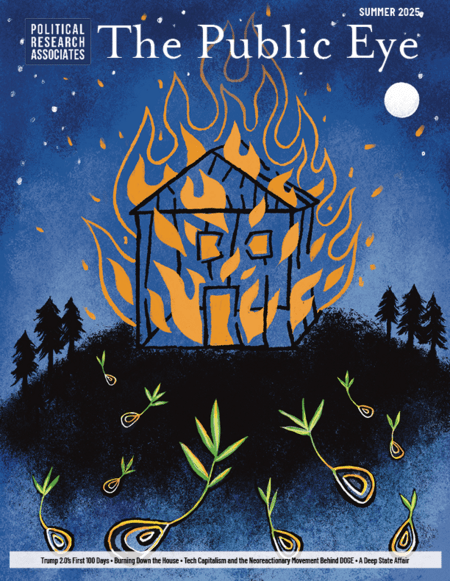The Public Eye Magazine
The Public Eye, Summer 2025
PRA observes in this issue that “we’ve witnessed a sweeping escalation of authoritarian attacks” during Trump 2.0’s first 100 days, ranging from efforts to gut the social state and consolidate executive power to those targeting marginalized groups and our right to dissent. And as this issue goes to press, the regime is unleashing military force on protestors to quash a popular uprising against ICE’s paramilitary raids.
At a time when our communities and social movements face intensifying Repression occurs when public or private institutions—such as law enforcement agencies or vigilante groups—use arrest, physical coercion, or violence to subjugate a specific group. Learn more , this Summer 2025 issue dissects Trump 2.0 and the antidemocratic reaction.
In “Trump 2.0’s First 100 Days”, PRA’s researchers offer their assessment of the regime’s unfolding agenda in a few key areas to watch. Our next feature powerfully outlines the forces behind this agenda. In an essay adapted from her new book, investigative journalist Katherine Stewart surveys the antidemocratic reaction’s alliance of billionaire funders, Short for Make America Great Again, the slogan of Donald Trump’s 2016 presidential campaign. Learn more activists, and more.
In our last feature, scholar Faith Lazar traces the Far Right’s changing relationship with the FBI, revealing how MAGA’s “Deep State” narrative is the latest form of a decades-long tradition of selective anti-statism.
Ending public provision is central to efforts to expand the president’s authority, as Matthew N. Lyons maintains in this issue’s commentary on the neoreactionary movement behind DOGE.
In our two online exclusives, Neil J. Young speaks with J. Gieseking about how the shifting politics of gay Republicans helped lay the groundwork for Trumpism, and Quinn Slobodian talks with Kitana Ananda about the neoliberal frontlash and return of “race science” fueling today’s Far Right.
Our cover features a beautiful illustration by artist and cultural organizer Micah Bazant. In The Art of Activism, they speak with PRA about how they interpreted the issue’s theme and the inspiration for their work.
Subscribe to the public eye magazine
Essential reading for researchers, activists, and academics concerned with how the Right is influencing our daily lives.







